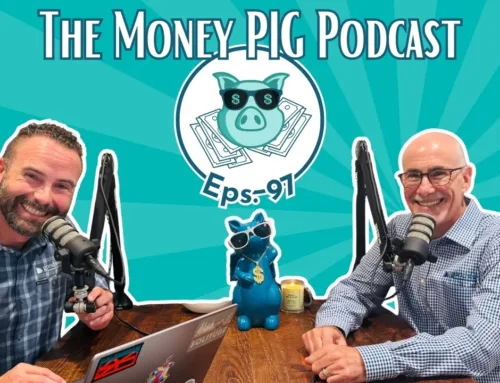
Link to YouTube – https://youtu.be/YrfuGSUZU3k
Link to BuzzSprout – https://www.buzzsprout.com/2136084/episodes/17711301
Summary:
In this episode of The Money Pig Podcast, Tim Goodwin and Justin Pitcock unpack the “O-Triple-B-A” (One Big Beautiful Bill Act) and what it could mean for your taxes, your estate plan, and your wallet.
They break down:
- Why keeping current tax brackets is a big win for many taxpayers
- Changes to the standard deduction, state and local tax (SALT) cap, and child tax credit
- New charitable giving rules—and how they could impact your strategy
- Estate tax updates, gift exclusions, and planning opportunities
- Temporary provisions like no tax on tips and a new senior deduction
- How Goodwin Investment Advisory helps clients navigate these shifting rules to save money and stay ahead
Whether you’re a family, real estate investor, retiree, or just trying to keep up with the ever-changing tax code, this episode gives you practical takeaways to potentially keep more in your pocket and make smarter moves with your money.
Listen now and learn how to use today’s tax law to your advantage—before some of these benefits expire.
Read the blog that inspired this episode and download the guide:
Blog Link: https://www.goodwininvestment.com/understanding-the-new-tax-law-what-the-obbba-could-mean-for-you/
Like, subscribe, and leave us a review if this resonated with you!
Enjoy the episode?
Subscribe, share it, and leave us a review on Apple or Spotify!
For personalized financial guidance, schedule an intro call with our team at Goodwin Investment Advisory in Woodstock, Georgia. Our CFP® professionals can provide advice and help you navigate how to invest your wealth and plan for your retirement. We’d love to help you live out your legacy! To learn more about the benefits and services we offer click here.
Goodwin Investment Advisory is a Registered Investment Advisory firm regulated by the securities and Exchange Commission in accordance and compliance with securities laws and regulations. Goodwin Investment Advisory does not render or offer to render personalized investment or tax advice through the Money PIG podcast. The information provided is for informational purposes only and does not constitute financial, tax, investment or legal advice.
Transcript:
And welcome back to the Money Pig Podcast. We are so very excited to have one, the only Justin Pickock back in the studio with us today. How you doing, Justin? Wonderful, wonderful. Wonderful, wonderful. And I would be remiss to not acknowledge that we have Vintoria SPIG right here supervising us to make sure that we behave. independence, and generosity. All right. So today we are talking about understanding the new tax law.
what the O-Triple-B-A could mean for you. But before we do, Justin. What does it mean? What does that mean to you? What does it mean to me? I’m kind of hoping that you could tell me more about what it means. So mostly just talking to Chad GBT about it. But I’m glad that we’re going to unpack it here audibly for our listeners. Before we do though, Justin, can you share maybe something interesting about you that the audience may not know? So I was thinking about the…
triple B a how are you okay and I’m I’m a hunter and so we use triple B shot for goose hunting okay so it’s you come to my house you can take out all these geese pooping all over my driveway my goodness this is yeah triple B shot for for this winter and okay that’s season is around here I hear that you know a nice goose cooked right can be very delicious is that true
No, there’s a stretch. You can, you can cook them where they taste good. But they’re not the easiest thing to cook. Gotcha. It’s, you rather be cooking some, some deer meat or some boar meat? yeah. Much better. Much better. Okay. Although like if you cook, if you marinate it, cook it like a steak, medium rare, like it can be pretty good. Okay. All right. That’s what it takes. Good to know. Good to know. I’m getting tempted to eat some of these keys on my own property. So,
So I don’t know if we’ve talked about this. you, are you regularly go to a chiropractor? No, you don’t. should though. Well, I never believed, in my chiropractor, but now I stand corrected. Cause he just in my mind, I get it. my goodness. Sorry. That was the dad joke right there. Obviously the listeners are like, it’s brutal.
Tim Goodwin (03:25.848)
get past this. just trying to keep it live and entertaining here before we just dive deep into tax law. So all right. So the one big, beautiful bill, I think I’m missing a B. What am I missing? Big, beautiful bill. There it is. Yep. There it is. There it is. The A. So tell us about this. What does this mean for us, Justin? Why is this important? So it’s, it’s saving. mean, like we run tax or I run tax.
scenarios for a lot of our clients and in our planning software, there’s been the setting where it’s like you can extend the way the brackets have been. Right. Or they to expire. to expire. They were going to sunset and they were going to be taxed the way we used to be before the current tax code came That’s a really good point. Like whether you, if you have a financial advisor up to this point, whether it us or somebody else, they’ve had to make this decision in your financial plans.
Do I just say the tax environment stays the same and these cuts remain or not? Because pre tax cuts and jobs act like the tax code for most, most of our clients would have resulted in higher tax. And so the fact that we’re getting to keep the same tax brackets that we’ve had since the tax cuts and jobs act is very beneficial. And that’s just by itself saving most of our clients between three and $6,000.
A year. year. In taxes. In taxes. because like we’re missing the 28 % tax bracket, which is where a lot of our clients would have otherwise been. And so they would have a substantial part of their income taxed at 28%. Now it’s all that income is taxed at 24%. Interesting. been taxed. That’s the way it will continue to When we were having to decide to project the tax environment for the future for our clients and their plans, we wanted these.
this tax cut, this jobs act to stay. We wanted the current tax rates. saving our clients taxes, which is improving their forecast. So the biggest thing this bill accomplished is just keeping the same tax rates we’ve had under tax cuts and jobs. I think that’s probably the most like beneficial across the board. Otherwise it would have been an increase for a lot of people. For a lot of folks. The other things, the standard deduction. So we actually got a small inflation adjustment in
Tim Goodwin (05:51.118)
Earlier this year before the OBBA passed, it was slightly lower and I think it’s like $750 per individual that it’s higher now thanks to the passage of this bill than it was under or what we were thinking it was going to be earlier this year. So for a couple filing joint, that’s another 1500 bucks. So what’s the total now for a couple filing joint like standard reduction? 31500. Wow.
Okay. And individual, do you know that off the of your head too? Half of that. Wow. Okay. That’s great. So not only did we preserve the bigger standard action and increase it increased. Okay. Yeah. Index for inflation. Um, there’s a bunch of other things in here. Gosh, we can go through a number of them, but, um, the state and local tax deduction has been a big pain point, especially for folks who own a lot of real estate and folks that live in high tax states.
So did that get reduced? That salt cap was 10,000. When did that happen? Do you remember cuts and jobs? Okay. Reduced it to 10. how dare they. And so, yeah, folks that would pay a lot of property taxes or have really high income taxes because they, they live in a state that has a high tax rate. what’s changed with OBAS made it much more beneficial. Honestly, it’s probably going to help folks that own real estate more than,
high income earners because there’s an income phase out. Right. And this creates a really big planning opportunity for folks. Cause if your income as, as a couple, is over 500,000, you start getting phased out of this, $40,000 salt cap. So it used to be 10 moved up to 40 to 40, once your income goes over 500,000 starts, starts getting phased out. for every dollar above five,
$50,000 you are losing part of your deduction, which effectively puts you in a 45 % marginal tax rate for a couple filing joint that has $40,000 worth of state and local taxes. In Georgia for most of our clients, most of our clients don’t have $40,000 of state and local tax if their income’s below 500,000. sure, sure. There’s, you know, for folks that own a lot of real estate, that’s the…
Tim Goodwin (08:16.11)
That’s gonna make a difference. That will make a difference. I’ve been reading this book called Tax Free Wealth, Robert Kiyosaki, CPA wrote it. you know, he talks a lot about how much of the tax code really gives you instructions for these deductions and itemization. And it’s really business owners and investors, specifically real estate investors, that can take advantage. There’s so much in the code, like over two thirds of this four million word
You know, tax code, talks about deductions and itemizations. And so now, now we’ve added, guess, to it with the O triple BA with the salt thing. But again, it’s, really incentivizing, real estate investing and there’s specific kinds of real estate investing gets even more incentives, but keep going. So yeah, the state and local tax. That’s a big one. there’s, some things like the child tax credit.
So that would have phased out. It was at $2,000 per child. Instead of getting phased out, was supposed to end next, or get phased down to pre-tax Cuts and Jobs Act, where it would have been $1,000 per child. Instead, we got to keep the $2,000 with an inflation adjustment, so it’s $2,200 per child. that’s a nice, and that’s a tax credit. That’s not a deduction. That’s for dollar credit. Nice, we like those. Oh yeah. Much better.
That’s a big win for families. Something that’s really interesting, I think, is the way charitable deductions are gonna be handled after this year. Tell us more about that. So starting next year, know, gosh, this new tax bill is…
It’s a, be called like the investment advisors job security act because there’s so many nuances in here. They’re making changes all the time. Gives us job security. It’s like, wants to keep up with all that? Just have your financial advisor. Keep up with that. my gosh. Certain provisions are in effect this year. Certain provisions go into effect next year. Some of them phase out over the next four years. So it’s, there’s a lot here and it’s hard to keep track of like when things start and you know, when things phase out, but.
Tim Goodwin (10:36.354)
Anyways, for the charitable deductions, starting next year, there’s going to be a hurdle rate. most people are probably familiar with the hurdle for being able to deduct your medical expenses. Medical expenses have to exceed 7.5 % of your adjusted gross income for that. Before you can deduct. expenses. That’s right. Starting next year, there’s a half percent of your AGI hurdle.
So in other words, we’ll make the math easier. If your AGI is $100,000, half a percent, okay, 500 bucks. So the first $500 worth of giving is non-deductible. Okay, you got to give away more than 0.5. And that even assumes you itemize. Okay. And so it’s the amount over that, just like the medical expenses are. Right. So then another part for high-income earners,
If you’re in the 37 % tax bracket, starting next year, they’re going to reduce your charitable, the value of your charitable deduction by two 37th. In other words, the benefit will be at the 35 % rate versus 37%. So it’s not very nice. So there’s half percent hurdle. Now we’re going to reduce it. We’re
benefits at the 35 % rate. I de-incentivizing giving at all. I still know that a lot of people give even if there wasn’t a tax benefit but yeah but certainly helps. Kind of I think the concession was whether you itemize or take the standard if you’re giving cash for a joint filer there’s a $2,000 below the line below the line deduction. Okay.
kind of this whole new category of deductions. Traditionally, like we think of a deduction as either being above the line. So you have your total income. Whether you itemize or not. Whether you itemize or not. So total income, then you have above the line deductions like HSA contributions, pre-tax 401k, your health insurance premiums. They lower your, from your gross income down to your AGI.
Tim Goodwin (12:53.42)
Now from your AGI, that’s where a lot of like tax credits and deduction, like phase outs, that’s the number that like it’s based off of. So you kind of have a little bit of control on what your AGI is by some of these above the line deductions. AGI is a key number. And then we call that the line below that would be below the line deductions. So that’s when you’re itemizing. That’s when you’re itemizing. That’s, know, mortgage interest, state and local tax charitable.
medical if it’s over 7.5 % of your AGI, those are traditional below the line deductions. And now there’s a whole category of deductions that are below that, whether or not you itemize or take the standard. And so this $1,000 for single filers, $2,000 for joint filers of cash donations is now a below the line, below the line deduction. There’s a few others.
that are This is also a CPA and tax preparer job security act, That’s right. Okay. So there’s a couple changes there around giving. Continue to share more. Yeah, go ahead. From what I understand is that it has to be a cash donation and it cannot go to a donor advised fund. We have a lot of clients that take advantage of donor advised funds. And so it’s something we need to start thinking about with our clients. Are they just barely giving enough to get over
the standard deduction based on their situation, which hey, the standard deduction’s so large that you actually have to, for most people, give away a lot of money before it’s beneficial to itemize. Should we be telling our clients to actually give cash instead of donating securities to these donor advised funds? Because now it can be the below the line, below the line deduction. it, yeah, okay, so yeah. Bottom line is that there’s strategy when it comes to your taxes.
you know, not just your investments and how you’re being generous, right? So we’re always encouraging our clients to be generous because it just it’s so purposeful and meaningful and just makes life so much better for the giver and the receiver typically. But yeah, it depending on how you give whether you’re giving cash or stocks or through a donor revised fund or not, really is going to depend on the amount and what the current tax code is. That’s right. Keep up with that. So let’s switch gears, maybe talk a little bit about the estate
Tim Goodwin (15:15.438)
plan changes and the big beautiful bill. And then we kind of, I’m kind of laying the plane here. Gosh. Yeah. we, we had clients that were really pretty nervous about, whether the, the estate tax exemption exemptions would get, maintained at the current levels that they’ve been, well, they actually just got upped. They got up to, worried about it going away. 15 million per individual. So if you’re married, filing joint, that’s 30 million. It’s going to be indexed for.
So those worries have gone away. That’s great. And yeah, so still as far as like a state planning strategy, if that’s a potential concern, you’ve got your annual gift exclusion. So go ahead and you could give up to $19,000 per recipient. So if you’re wanting to gift money to your kids, it could be $19,000 each and that’s per spouse. So really it’s double that. Right.
There’s, uh, so that summarizes it really. think the big changes from a state side. Yeah. We didn’t cover, um, the kind of some other temporary, uh, provisions that made some like headlines. Yeah, go ahead. There’s, um, the no tax on tips. Now it’s only cash tips and it’s up to 25,000 and there’s an income phase out. Right. So, you know, I think a lot of people got really excited about this.
It has to be a job that’s customarily paid by TIPS. You can’t start doing that here. can’t start tipping your advisor. I mean, we’ll gladly accept it. But it has to be a job that normally is compensated through TIPS. And there’s that 25,000 limit for joint filers, 12,500 for single filers. There’s the…
added a senior tax deduction. So if you’re 65 or older, it’s $6,000 per individual. you file a joint, it’s $12,000. Nice. But that phases out as well. So if your income, if your AGI is over 150,000, you’re filing a joint tax return. You start getting phased out of that. So if you and your spouse are over 65 for every dollar that counts towards your AGI over 150,000,
Tim Goodwin (17:39.929)
you’re reducing this deduction by 12 cents. effectively it’s kind of like the cost of having that additional income is a little bit higher. That’s where we as advisors should think, how should we optimize this distribution strategy for a retiree? Should we pull a little bit out of Roth, try to keep that AGI below 150? Right, so then I’ll get phased out of that six grand. yep, more strategies there. So well, as we wrap this up,
you’re kind of mentioning some of these very specific things like just now about the distribution and trying to help on the income when they’re retired. So maybe explain how Goodwin Investment Advisory helps clients navigate these decisions, especially with like these temporary provisions. my gosh, yeah. So we need to know your situation. if you’re, whether you’re in the accumulation phase or distribution phase, like we need to get to know, if you’re considering hiring us or some other advisor like-
We need to know your situation, know what your resources are, when the timing of your income is, and we want to try to help optimize that so that you’re getting to take full advantage of some of these deductions. Some of these are only here for the next four years. Like the senior deduction phases out over four years, the no tax on tips and overtime phases out over the next, goes away after four years.
Yeah, and my advice to the listeners should be, know, ask your advisor to help strategize on your taxes. Yeah, we can do that. If your advisor is not helping you do that, you might want to find one that does or see if you can get your CPA or a tax advisor to help you. But you really it’s it’s it’s worth trying to better understand the tax code, because the more you understand it, the more you’re going to be able to save on taxes. You know, so much more the tax code talks about how to take advantage of these itemizations and the deductions.
then even talks about what the taxes are, the raises. So if you didn’t, if we’re just like wetting your appetite here for the O-B-B-A, we do have a great blog on this that Tara wrote, shout out to Tara, understanding the new tax law, what O-B-B-A, O-B-B-B-A could mean for you. you can, O-B-B-B, you can either sign up for the blog, if you are signed up, you’ll have this in your inbox already.
Tim Goodwin (20:04.204)
And if you go to the show notes and get it, or you can go to goodwininvestment.com, click on Knowledge Center. We didn’t cover it all. Like there’s other provisions in here. Right. gosh. think I know you guys are real disappointed that we didn’t cover all the changes in there, but yeah, there are more. We just kind of picked out a few of them. So check it out on the website. If you want to begin the conversation with us, you can do that by scheduling a call at goodwininvestment.com. Justin, I love signing off with gratitude. You know, just kind of sharing what we’re grateful for.
I just want to share what I’m grateful for is mentors and having some local mentors that I get to have lunch with or maybe breakfast with or something and just to have access to folks that really inspire me and a lot of times are just really, really generous. So I need to make sure they know about these changes in the bill, about their generosity, but I’m just grateful like you were sharing about friends and things like that earlier that I’ve got some mentors at Well that are really inspiring. What about you? What are you grateful for lately?
Um, and, uh, got to spend some time outdoors this past weekend and this, the cooler weather, the little teaser in the of the summer. Gosh. Super grateful for some cooler days. Looking forward to the fall. So miserable to get outside before that. So it’s just nice to be able to just get outside and enjoy fake fall for a little while. Yeah. Fake fall. Yeah. All right. Well, thanks again, Justin, for coming and thank you listeners for joining us today. And, uh, if we can help let us know otherwise have a great day. Bye bye.

The Money PIG podcast is hosted by Reid Trego. Goodwin Investment Advisory is a Registered Investment Advisory firm regulated by the Securities and Exchange Commission in accordance and compliance with securities laws and regulations. Goodwin Investment Advisory does not render or offer to render personalized investment or tax advice through the Money PIG podcast. The information provided is for informational purposes only and does not constitute financial, tax, investment or legal advice.
For personalized financial guidance, schedule an schedule an intro call with our team at Goodwin Investment Advisory in Canton, GA . Our CFP® professionals can provide advice and help you navigate how to invest your wealth and plan for your retirement. We’d love to help you live out your legacy!
Goodwin Investment Advisory is a Registered Investment Advisory firm regulated by the Securities and Exchange Commission in accordance and compliance with securities laws and regulations. Goodwin Investment Advisory does not render or offer to render personalized investment or tax advice through the Money PIG podcast. The information provided is for informational purposes only and does not constitute financial, tax, investment or legal advice.










